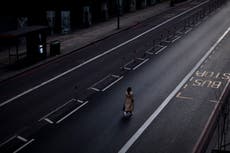I’m a frontline domestic violence worker – the first time I refused refuge to migrants, I cried for five hours
I couldn’t understand why I had to turn them away over immigration matters when their lives were in danger


Your support helps us to tell the story
From reproductive rights to climate change to Big Tech, The Independent is on the ground when the story is developing. Whether it's investigating the financials of Elon Musk's pro-Trump PAC or producing our latest documentary, 'The A Word', which shines a light on the American women fighting for reproductive rights, we know how important it is to parse out the facts from the messaging.
At such a critical moment in US history, we need reporters on the ground. Your donation allows us to keep sending journalists to speak to both sides of the story.
The Independent is trusted by Americans across the entire political spectrum. And unlike many other quality news outlets, we choose not to lock Americans out of our reporting and analysis with paywalls. We believe quality journalism should be available to everyone, paid for by those who can afford it.
Your support makes all the difference.I’ve spent the last three years as a frontline domestic violence worker, assisting women and girls experiencing violence to access help and safe spaces. The first time I refused a family – who were migrants – refuge space, I cried for five hours straight.
I was ready to quit my job and leave social work entirely. I could not understand why I had to turn them away over matters of immigration when their lives were in so much danger.
Like many women in my field, I entered the VAWG (violence against women and girls) sector because I wanted to make a difference. My first job was for a large charity that offered refuge provision for women and children fleeing domestic abuse. As a generic organisation, their acceptance criteria were directly linked to immigration status.
Eligibility for the vast majority of refuges in the UK is reliant on your ability to access public funds. For many migrant women, the benefits system is completely out of reach. This means that in cases of domestic violence, their stay in refuge cannot be funded. The option of safety is non-existent, and no alternative is offered, as local housing authorities often have no duty to house them either.
Migrant women are given the ultimatum of staying with their perpetrators – or risking street homelessness. We are quick to ask why women stay, but never stop to wonder what prevents them from leaving.
At times, I felt more like a gatekeeper than a support worker. The VAWG sector prides itself on empowering women to make their own choices, but there is nothing empowering about diminishing someone’s existence to the flag on their passport.
The people who tell women they are believed, are also forced to interrogate them on their right to be in this country. As frontline workers, it is not our fault that these questions have to be asked; but knowing this does not detract from our feelings of hypocrisy.
Black, Asian and Ethnic Minority women make up the greatest proportion of migrant women survivors, with institutional racism only adding to their difficulties in getting help. For me – as a woman of colour – the guilt I felt became too much to bear.
I was haunted by the voices of the women I could not support, constantly wondering how similar their stories might have been to my mothers, or grandmothers, or perhaps even mine. I felt like I was failing my community, which is why moving to the specialist sector became a necessity.
Specialist services are run by, and for, marginalised women; and offer a lifeline to those commonly excluded from generic support. Speaking to someone who looks and sounds like you makes it easier to disclose abuse safely, as it removes the fear of discrimination and increases cultural sensitivity.
Abuse is characterised by power and control. In an abusive relationship, there is always an imbalance of power. Control is used to achieve and maintain said power. The way perpetrators achieve this power varies. Sometimes it is physical, other times economic. It is always psychological: slow and steady degradation, belittling someone more and more every day. Diminishing their self-esteem by telling them that they have no worth or rights or freedom.
It is difficult to know who mimics whom in this situation, but one thing that is clear is that both perpetrators and this government are guilty of inflicting such pre-meditated violence on the most marginalised.
I am pleased to finally offer support to the women left behind by generic services, but the battle to protect migrant women remains uphill. The chronic underfunding of the specialist domestic violence sector speaks volumes on just how little the government care about survivors.
For us, every day feels like a war against statutory services, who have been meticulously advised on how to best avoid supporting these women. Survivors not only fight for their lives, but for the right to be merely acknowledged by the systems that claim to protect us. Enabling this level of discrimination has created a culture of normalising abuse against migrant women.
The pandemic and its subsequent lockdowns have seen a significant spike in domestic violence cases. The government’s acknowledgement of this was slow, with the message from the home secretary now reading, “speak out and ask for help”. She neglects to mention, however, that help is only accessible to a select few.
For many women and children, speaking out is a pipeline to institutional abuse. For others, asking for help will just be answered with “no”. Put simply, these women have nowhere to go. Placing the onus of speaking out on survivors is a tactic by the government to avoid any real responsibility in abolishing the hostile environment for survivors of domestic abuse.
We often speak about the additional barriers survivors face when accessing support, but the word “barrier” does little justice to the reality migrant women are really faced with. The hostile environment is a death sentence for so many. We must remember that selective safety is still violence. Their deaths were avoidable and inexcusable.
Solidarity with migrant women is also an act of remembrance for those who did not live to be survivors. The right to live free of violence must be accessible to us all, regardless of immigration status or nationality.
Migrant women need that freedom now, which is why the Women’s Equality Party are calling on directly elected Mayors to veto hostile environment policies and create Sanctuary Cities for migrant survivors of abuse.
This Thursday, they launched the Sanctuary City campaign, which calls on all directly elected mayors to guarantee safe accommodation, access to specialist support, legal representation and a guarantee that migrant women reporting abuse will not be referred to immigration authorities.
It is a bold approach – pushing mayors themselves to override barriers and take responsibility for ensuring migrant women are not turned away. It is exactly the kind of leadership that is needed to dismantle the hostile environment that our government has created; because, let’s face it, they never will.
If you are worried about yourself or someone else, you can contact the 24 hour National Domestic Violence Freephone Helpline on 0808 2000 247.
Ammaarah Zayna is a frontline domestic violence worker. She is a freelance writer who specialises in gender and racial justice – more of her work can be found here



Join our commenting forum
Join thought-provoking conversations, follow other Independent readers and see their replies
Comments